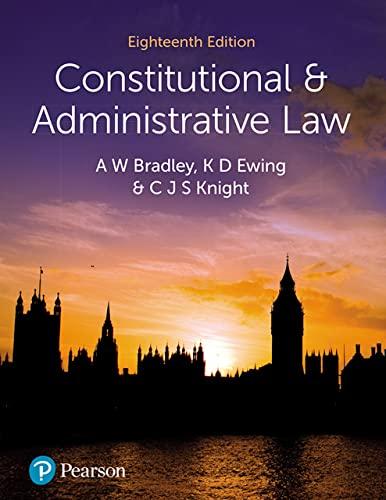Question
DIRECTIONS: Response post for 2 separate discussions: Provide analysis of each discussion and provide 1 question for each discussion . Discussion 1: Tex. Penal Code
DIRECTIONS: Response post for 2 separate discussions: Provide analysis of each discussion and provide 1 question for each discussion .
Discussion 1: Tex. Penal Code 15.01 discusses the criminal attempt. The required elements are that specific intent to commit the offense be present. The caveat to this element is that the actions should amount to more than preparation but be less than completion of the offense. The code also notes that actual completion of the offense cannot be a valid defense against the attempted charge in court. Though the law is short, it meets the basic elements for attempt as described in the module reading. The classification under the Texas Penal Code for criminal attempt states that the attempted charge will be considered one category lower than the actual offense attempted. This seems appropriate in cases in which the requirements for attempt are met. If someone goes through all of the effort to commit a crime and simply does not complete the criminal act, it seems reasonable to be punished to the equivalent of a category lower than the attempted crime.
Discussion 2: A.R.S. 13-1002 addresses Solicitation, an inchoate offense. "A person...commits solicitation if, with the intent to promote or facilitate the commission of a felony or misdemeanor, such person commands, encourages, requests or solicits another person to engage in specific conduct which would constitute the felony or misdemeanor or which would establish the other's complicity in its commission."
This law focuses on two major aspects. First, the intention to promote or facilitate a crime that maybe either a felony or misdemeanor. Secondly, the actions that "...invites, requests, commands, hires, or encourages another to commit a crime" (Dressler, J. 2018 p. 393). These two actions combined will determine the degree of penalty based on the severity of the offense solicited.
These actions have a varying degree of implications based on the level of the crime committed. The class of felony or misdemeanor, for a solicitation action under this law is two levels below the solicited offense conducted (i.e. 1. Class 3 felony if the offense solicited is a class 1 felony, Class 1 misdemeanor if the offense solicited is a class 5 felony, etc.). I suppose the merits of the punishment rest on two factors; 1) the crime solicited, is the social harm and public perception of that harm enough to deter that action; 2) the ability to get a conviction, based on a person's action that falls under this solicitation.
If we are not careful in our sentencing guidelines, we may find juries acquitting a person from the use and application of jury nullification. Not because they are not guilty but because the jury may perceive the person may have been punished enough (Dressler, 2018). Additionally, I can see solicitation and ones right to free speech may be a fine line, between action and just free speech.
Step by Step Solution
There are 3 Steps involved in it
Step: 1

Get Instant Access to Expert-Tailored Solutions
See step-by-step solutions with expert insights and AI powered tools for academic success
Step: 2

Step: 3

Ace Your Homework with AI
Get the answers you need in no time with our AI-driven, step-by-step assistance
Get Started


